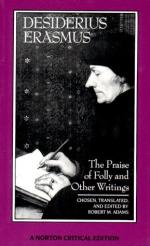
|
| Name: _________________________ | Period: ___________________ |
This test consists of 15 multiple choice questions and 5 short answer questions.
Multiple Choice Questions
1. Folly states that not wanting more than your share of wisdom is a true sign of what?
(a) Reverence.
(b) Stupidity.
(c) Prudence.
(d) Folly.
2. Erasmus complains that many people find jokes against popes and princes more offensive than what?
(a) Blasphemy.
(b) Murder.
(c) Perjury.
(d) Sarcasm.
3. Folly's father is the god of what?
(a) Peace.
(b) Pleasure.
(c) War.
(d) Riches.
4. To what does Folly recall the elderly?
(a) Childhood.
(b) Fantasies.
(c) Middle Age.
(d) Wisdom.
5. Whom did the ancient sophists praise?
(a) Trivialities.
(b) Themselves.
(c) Gods and heroes.
(d) The learned.
6. Which god was given a name that means "foolish" in Greek?
(a) Zeus.
(b) Aphrodite.
(c) Bacchus.
(d) Venus.
7. Erasmus follows the well-known popular proverb that states that a man should do what?
(a) Praise himself, if no one else will.
(b) Praise others before himself.
(c) Defame himself.
(d) Speak with false humility.
8. What happens when Folly begins addressing the crowd?
(a) They become mad.
(b) They fall asleep.
(c) They become cheerful.
(d) They start jeering.
9. What must one do to be considered a god, according to Folly?
(a) Help mortals.
(b) Be born of a god.
(c) Be immortal.
(d) Have divine powers.
10. If someone could look down upon the life of man as Jove does, what does Folly say he would see?
(a) Great folly.
(b) Many disasters.
(c) Ease and comfort.
(d) Many blessings.
11. Erasmus believes he is not writing sarcasm, but what instead?
(a) Innocent jokes.
(b) Allegorical interpretation.
(c) Criticism and dissent.
(d) Warning and advice.
12. Folly is in poor repute even amongst whom?
(a) The learned.
(b) The greatest fools.
(c) The noblemen.
(d) Madmen.
13. In Folly's opinion, what develops prudence?
(a) Hope.
(b) Flattery.
(c) Wisdom.
(d) Experience.
14. Erasmus answers the charge that he is too sarcastic by saying that ________ has always enjoyed freedom to exercise their wit on the common life of man.
(a) Noblemen.
(b) The insane.
(c) Jesters.
(d) The intelligent.
15. Which soldier was "as cowardly in battle as he was skilled in speech-making"?
(a) Cicero.
(b) Demosthenes.
(c) Quintilian.
(d) Erasmus.
Short Answer Questions
1. Who considers themselves gods on earth if they can use Greek words in their speeches?
2. Whom does Folly consider more foolish than men?
3. Who does Folly say makes men satisfied with themselves?
4. By Stoic definition, what does folly mean?
5. In criticizing the men of his day, whom does Erasmus name?
|
This section contains 373 words (approx. 2 pages at 300 words per page) |

|




